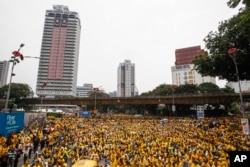Malaysia’s Prime Minister Najib Razak is battling against calls for his resignation over a $700 million financial scandal. Weekend rallies calling for his ouster drew as many as 200,000 people protesting in Kuala Lumpur. Analysts are divided over whether the prime minister can hang on to power.
Allegations of corruption
The trouble for Prime Minister Najib Razak started in July with media reports alleging that a state development fund that he had set up had channelled $700 million in public funds to his private accounts.
The prime minister has flatly denied the reports and removed several officials who have criticized his handling of the scandal.
But that has not ended the public uproar. Over the weekend, as many as 200,000 protestors in Kuala Lumpur called for his resignation. Police put the number at 25,000.
Vowing not to resign
Najib responded in a National Day address vowing he would not quit the prime minister’s post. The prime minister said the funds were a donation from the Middle East.
He attacked the protesters saying they showed a “shallow mind and poor national spirit.”
Political scientist, Bridget Welsh, from the National Taiwan University, said the protests, drawing most support from Malaysia’s Chinese community, are a bid by the urban middle class to find the country’s ‘moral compass.’
“It wasn’t as inclusive as the organizers had hoped from the perspective of being able to reach the middle ground, so most of the protesters were largely in the opposition camp. [But] you’ve increase polarization and a deepening of the polarized fault lines within Malaysia in terms of how people see politics and how they see the future,” she said.
Peaceful protest
The rally, despite tight security, was peaceful in contrast to previous protests in 2011 and 2012 when police dispersed the crowds using tear gas and water cannons.
Largely absent were supporters from the pro-Islamic PAS party, and the rally was without the presence of charismatic opposition leader, Anwar Ibrahim, now serving a five-year prison sentence after a sodomy conviction was upheld.
Welsh expected Najib to withstand the current pressure for him to step aside for now.
“So short term Najib seems to be there but long term what we’re looking at is a very, very tenuous situation for the Prime Minister. He’s lost a lot of international and domestic credibility and every day that he’s there is a continuation of the scandal and the crisis,” stated Welsh.
Other analysts, including William Case from City University in Hong Kong, said Najib’s position instead has been strengthened by divisions within the political opposition.
“I would say that Najib Razak has just had a very good protest and I think that if anything the composition of the protest and the way it played out, and the restraint shown by the police and all these things together mean that that if anything this Bersih has actually strengthened the Prime Minister’s hand and made it more likely that he’ll survive this scandal over [the state fund] 1MDB,” explained Case.
Case said the opposition is split as the pro-Islamic PAS is now no longer cooperating with other elements of the opposition.
He said the presence at the rallies of former Prime Minister Mahathir Mohamad, who had led the governing United Malays National Organization (UMNO), highlighted Najib’s stronger position as Mahathir had been seeking support within UMNO in calling for the prime minister’s resignation.
Analysts say they expect Najib to look to exploit the growing political polarization in Malaysia in the months ahead.
But former government members are to meet on September 9 in a bid to present what they call "an honorable exit strategy" for the Prime Minister. Malaysia is not due to face fresh elections until 2018.








